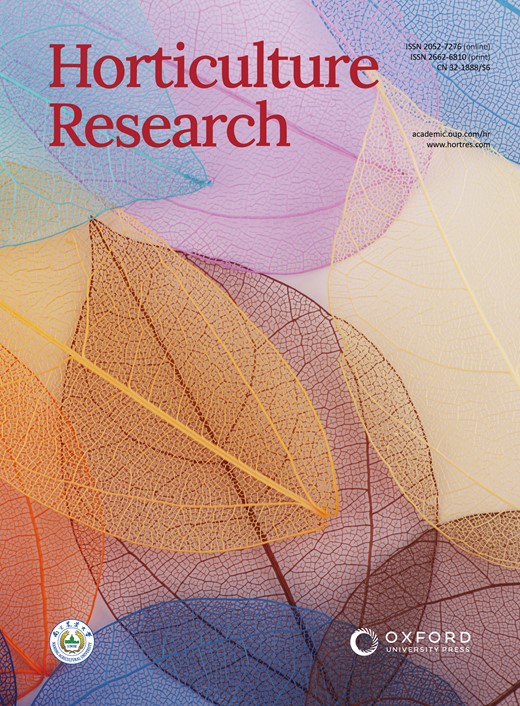Slow and steady wins the race: the negative regulators of ethylene biosynthesis in horticultural plants
IF 8.7
1区 农林科学
Q1 Agricultural and Biological Sciences
引用次数: 0
Abstract
The gaseous hormone ethylene controls a variety of physiological processes in horticultural plants, including fruit ripening and elongation, flower development and senescence, and responses to stresses. The functions of ethylene in these processes are intimately linked to its precise biosynthesis, which is finely tuned by a complex network of positive and negative regulators. While significant progress has been made in understanding the roles of positive regulators in ethylene biosynthesis, the negative regulators of ethylene biosynthesis has only recently begun to receive more focus. Ethylene biosynthesis is a simple two-step reaction in land plants, committed by two dedicated enzymes, 1-aminocyclopropane-1-carboxylic acid (ACC) synthase (ACS) and ACC oxidase (ACO). Over the past decade, a growing number of research has identified a wide range of transcriptional, posttranscriptional and epigenetic negative regulators for ACS and/or ACO in horticultural plants, greatly enhancing our understanding of the intricate network that modulates ethylene production. In this review, we provide a comprehensive overview of the negative regulators that mediate ethylene biosynthesis in horticultural plants, with respect to their functions and molecular mechanisms, and their responses to external environmental stimuli or internal growth signals.缓慢而稳定的赢得比赛:园艺植物中乙烯生物合成的负调节因子
气体激素乙烯控制着园艺植物的多种生理过程,包括果实的成熟和伸长,花的发育和衰老,以及对胁迫的反应。乙烯在这些过程中的功能与其精确的生物合成密切相关,这是由一个复杂的正负极调节网络精细调节的。虽然在了解乙烯生物合成中的正调节因子的作用方面取得了重大进展,但乙烯生物合成的负调节因子直到最近才开始受到更多的关注。乙烯生物合成是陆生植物的一个简单的两步反应,由两种专用酶,1-氨基环丙烷-1-羧酸(ACC)合成酶(ACS)和ACC氧化酶(ACO)完成。在过去的十年中,越来越多的研究已经确定了园艺植物中ACS和/或ACO的广泛的转录,转录后和表观遗传负调控因子,极大地增强了我们对调节乙烯生产的复杂网络的理解。本文就园艺植物中介导乙烯生物合成的负调节因子的功能、分子机制以及它们对外界环境刺激或内部生长信号的响应等方面进行了综述。
本文章由计算机程序翻译,如有差异,请以英文原文为准。
求助全文
约1分钟内获得全文
求助全文
来源期刊

Horticulture Research
Biochemistry, Genetics and Molecular Biology-Biochemistry
CiteScore
11.20
自引率
6.90%
发文量
367
审稿时长
20 weeks
期刊介绍:
Horticulture Research, an open access journal affiliated with Nanjing Agricultural University, has achieved the prestigious ranking of number one in the Horticulture category of the Journal Citation Reports ™ from Clarivate, 2022. As a leading publication in the field, the journal is dedicated to disseminating original research articles, comprehensive reviews, insightful perspectives, thought-provoking comments, and valuable correspondence articles and letters to the editor. Its scope encompasses all vital aspects of horticultural plants and disciplines, such as biotechnology, breeding, cellular and molecular biology, evolution, genetics, inter-species interactions, physiology, and the origination and domestication of crops.
 求助内容:
求助内容: 应助结果提醒方式:
应助结果提醒方式:


